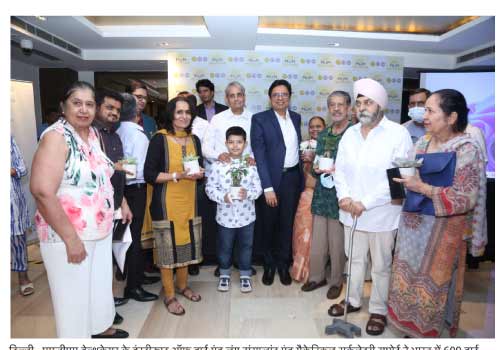Sixty nine-year-old Delhi resident Purushottam Arora and nine-year-old Sanyam Sharma from Jammu barely knew each other. But on Thursday, the duo came together to celebrate a unique milestone — a second chance at their lives.
Arora was diagnosed with dilated cardiomyopathy, a heart muscle disease, 10 years ago, and was given mere days to live. Sanyam was similarly diagnosed with the life-threatening ailment in the middle of a raging pandemic in 2021. Both of them underwent successful heart transplants at Chennai’s MGM Healthcare and are today living healthy, disease-free lives.
They joined a room full of other survivors in Delhi Thursday to celebrate 600 successful heart and lung transplants in 2023. Almost all survivors spoke about the need for more organ donations in the country.
Arora was ecstatic about how he had pulled through with the help of MGM’s doctors, among whom present in Delhi were Dr K.G. Suresh Rao, Dr Apar Jindal and Dr K. R. Balakrishnan.
“When I was admitted, I barely had a few weeks to live. Now, I work for 12 hours a day and am intent on completing a century,” Arora said.
At the event, Dr Balakirshnan said north India was lagging behind the south in donations. “Although there are enough resources for transplantation, the waiting list for transplants across the country is long due to a lack of awareness,” he added.
He further hoped that northern states would start paying donors just like in the south, since this money can be of help too to those who need organs. Sometimes, a donor’s family does not accept the money, which is then put in a trust to fund transplants of economically-weak patients.
Barriers and breakthroughs
According to The National Library of Medicine, the scarcity of donor hearts, as in any other country, is the rate-limiting step in heart transplantation in India. In addition to financial hurdles, mistrust and taboo are also considerable.
Various hospital websites list starting costs as low as Rs 2,000,000, excluding the costly post-transplant treatment. Despite efforts of the National Organ and Transplant Programme (NOTP) to finance transplantation for patients below poverty line (income Rs 30 per day), transplants remain a concern.
However, India is working hard to overcome these obstacles. In August 2018, India set a world record with over 24,000 organ donation promises in one day, which it then topped in November 2019 with over 54,000 pledges.
Another concern is the geographical disparity in donor availability and transplant rates. Transplants are predominantly performed in southern India, largely due to religious beliefs and lack of health literacy in North India which hinder organ donation.
Dr Suresh Rao, Co-Director of MGM, said: “Patients with heart failure and lung failure are at an elevated risk of death and can be helped by timely interventions like heart and lung transplants. Mechanical circulatory supports like ECMO and LVADs can be used as a bridge to transplant in very sick patients.”
Thursday’s event at a Delhi hotel saw doctors gift each survivor a plant — one that would grow as they lived their lives.
MGM’s Chairman of Cardiac Sciences, Dr Balakrishnan said: “Heart transplants have seen people live normal lives, get a second chance, even win the Olympics.”
He was giving the example of Karhun Nanda, who won a silver medal in golf at the World Transplant Games 2019 and 2023, an international athletic event for transplant athletes.
The MGM team and the survivors underscored the need for collaborative efforts both by the central and state governments to raise awareness around organ donation and to bring out schemes to make transplants accessible to every citizen.
Speaking to ThePrint, Dr Balakrishnan added, “Accessible and affordable are two different things. Indian
healthcare is actually affordable and perhaps more than in many other countries. But to make it accessible is something that a government needs to focus on. In the US, elections are fought on issues of healthcare. In a democratic country, these are issues that should make it to the election agenda — accessible healthcare across all demographics.”
MGM Healthcare has India’s largest heart and lung transplant programme, and some of the major milestones in the last year include South Asia’s first biventricular artificial heart implant —Berlin Heart — and being the third centre in the world to perform a bilateral lung transplant on a person with COVID-induced damaged lungs.
In addition, the hospital is India’s first USGBC LEED Platinum-certified facility, having the highest green-rating — for environmentally sustainable techniques — in Asia.
Links:
https://theprint.in/india/had-days-to-live-now-i-work-12-hours-daily-organ-recipients-share-stories-of-survival-hope/1620800/
Cardiac Sciences
Gastro Sciences
 Minimal Access GI & Bariatric Surgery
Minimal Access GI & Bariatric SurgeryHeart & Lung Transplant
 Multi-Visceral and Abdominal Organ Transplant
Multi-Visceral and Abdominal Organ TransplantLiver Transplant
 Neurosurgery
Neurosurgery Neurology
Neurology Spine Surgery
Spine SurgeryObstetrics and Gynaecology
Orthopaedics
 Total Knee replacement
Total Knee replacementRenal Sciences
ENT, Head & Neck surgery
Internal Medicine
 Anaesthesiology & SICU
Anaesthesiology & SICUEmergency Medicine
Radiology and Imaging Services
Aesthetic & Plastic Surgery
Dermatology
Laboratory services & Blood Bank
Maxillofacial & Dental Surgery
Critical Care
Opthamology
Pain Management
Pulmonology
Rehabilitation Medicine
Pediatrics and Neonatology
 Paediatric Cardiology
Paediatric Cardiology Emergency Na MGM
Emergency Na MGM IVF
IVF Oncology Treatments
Oncology Treatments +91 44 4200 4200Emergency
+91 44 4200 4200Emergency
 In-person Consultation
In-person Consultation Online Video Consultation
Online Video Consultation Treatment Enquiries
Treatment Enquiries Find a Doctor
Find a Doctor Access the Patient Portal
Access the Patient Portal +91 44 4524 2407
+91 44 4524 2407 

